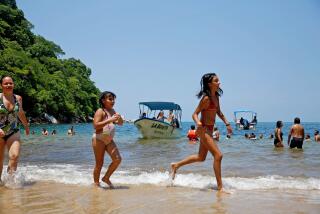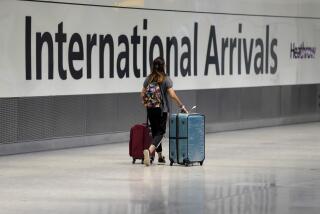Pakistan and Kenya Visitors Should Exercise an Extra Measure of Caution
- Share via
World Travel Watch is a monthly report designed to help you make informed judgments about travel throughout the world. Because conditions can change overnight, always make your own inquiries before you leave home. In the United States, contact the nearest passport agency office; abroad, check in with the nearest American embassy .
Asia
--Pakistan: Islamic fundamentalists have been quietly calling for the ouster of Prime Minister Benazir Bhutto because she is a woman, and some observers fear that this could lead to retaliation from her supporters and unrest in cities already subject to periodic ethnic violence. Exercise caution.
Africa
--Kenya: Due to an increase in robberies in remote areas by armed wildlife poachers and bandits, several precautions should be taken. Solo travel is not safe in the national parks--go with a game ranger or guide from a reputable safari company, and consider asking your tour operator to book a game ranger as well as a guide. Ask about security arrangements in advance when planning an overnight stay in a remote area; if inadequate, choose another lodging. Travel in large groups and insist that groups stick together.
--Tanzania: Severe restrictions on photography are enforced, although no restrictions are in effect in the game parks. Avoid photographing anything that could be construed to be security-related, including military installations, industrial sites, airports, harbors, bridges, railway stations, hospitals, government buildings and schools. Travelers with evidence of past or future travel to South Africa may be detained or denied entry. Travel to remote areas should be attempted only after consulting with authorities. Immunizations for cholera and yellow fever are required.
Middle East
--Israel: Travel to the West Bank and Gaza is not recommended due to continuing unrest. Those who must travel to the West Bank should avoid town centers because of threats of violence against foreigners. Travel to East Jerusalem (including the Old City) is generally safe, although the situation could change. Exercise caution, avoid demonstrations and carry your passport at all times. For current information on conditions in the West Bank, contact the American Consulate General in Jerusalem. Regarding travel to Gaza, contact the American Embassy in Tel Aviv.
Europe
--Sweden: A new car ferry between Stockholm and the Estonian port of Tallinn will open next summer with three overnight crossings per week.
South America
--Colombia: Because of the government’s heightened efforts to control drug trafficking, violence has increased in this already troubled country. The security situation is likely to remain unsettled in many areas, and non-essential travel here is not recommended. Cartagena, a center for international tourism, has not been affected by the increased tension, but there has been banditry outside the city.
--Peru: Terrorism and crime remain serious problems throughout the country. The major tourist sites are relatively safe, but caution is necessary. Stay on or near well-traveled roads when visiting the ruins around Cuzco because of the possibility of violent crime. Thousands of people take the train safely from Cuzco to Machu Picchu each year, but there have been instances of robbery and sabotage, and no security is provided along the route.
Hikers should avoid the Inca Trail unless traveling in large groups with guides because robberies are frequent and sometimes result in serious injury. There have been two recent deaths there. The Colca Canyon, reputedly the deepest canyon in the world, has also been the site of numerous robberies. Travel only in large groups with reputable tour operators. Road travel is risky throughout rural areas, especially on public buses, because of bandits, poor road conditions and inadequate bus maintenance. Don’t travel by road at night. Use common-sense precautions against street crime in the cities.
Central America/Caribbean
--Guatemala: There have been several terrorist incidents in Guatemala City in the last few months, and robberies of vehicles traveling between the capital and Panajachel, the major tourist site on Lake Atitlan. Travelers should avoid the areas south of the lake, and regions in the north along the Mexican border due to occasional guerrilla activity. Travel to the main tourist sites of Tikal and Antigua remains safe, and travel throughout the rest of the country is essentially normal from a security standpoint. Use common-sense precautions against street crime, especially in crowded markets.
--Jamaica: One year after Hurricane Gilbert devastated the island, Jamaica’s tourism industry is back to normal, with all but two of the country’s main resorts open and fully operational. These two, both in Runaway Bay, are scheduled to open Dec. 15, and should mark the complete recovery from the hurricane that struck last September. Most of the resorts were open within months of the storm. Hurricane Hugo, which recently battered the eastern Caribbean, did not touch Jamaica.
The famed Dunn’s River Falls in Ocho Rios continues to be a popular draw despite increased harrassment and theft, problems which local officials are addressing. Leave valuables at your hotel and be aware of what’s happening around you. Croydon on the Mountain, in the hills near Montego Bay, offers a fascinating tour of a working plantation where pineapple, coffee, citrus and plantain are the main cash crops.
“Meet the People,” a program offered by the Jamaica Tourist Board since 1965, provides a way to meet residents with interests similar to yours in their own homes, whether it be a neurosurgeon or a reggae musician. For information, contact the Jamaica Tourist Board at 3440 Wilshire Blvd., Suite 1207, Los Angeles 90010, (213) 384-1123.
North America
--Bermuda: Health authorities recently acknowledged that the island chain has one of the highest AIDS rates in the world. About one in every 200 people among the population of 58,000 is infected with the virus, a rate second only to French Guiana and six times that of the United States.
Australia/Oceania
--Australia: Australia and New Zealand have offered to shelter the inhabitants of the Cook Islands, Fiji, Kiribati and Tuvalu if the greenhouse effect raises sea levels to the point where the islands would have to be evacuated.
Southeast Asia
--Burma (Union of Myanmar): The government recently freed 17,000 convicts to make room in prisons for political opponents, raising questions about a possible increase in crime and eroding hopes that any kind of free election can be held as scheduled in May. Exercise caution.
More to Read
Sign up for The Wild
We’ll help you find the best places to hike, bike and run, as well as the perfect silent spots for meditation and yoga.
You may occasionally receive promotional content from the Los Angeles Times.






